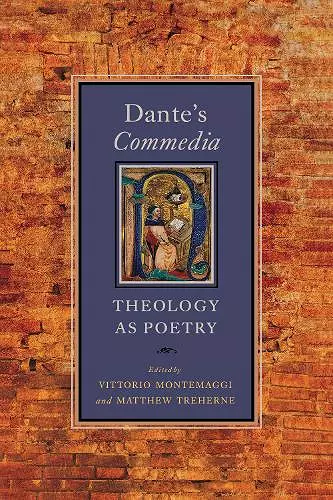Dante's Commedia
Theology as Poetry
Matthew Treherne editor Vittorio Montemaggi editor
Format:Hardback
Publisher:University of Notre Dame Press
Published:15th Mar '10
Currently unavailable, and unfortunately no date known when it will be back

In Dante's Commedia: Theology as Poetry, an international group of theologians and Dante scholars provide a uniquely rich set of perspectives focused on the relationship between theology and poetry in the Commedia. Examining Dante's treatment of questions of language, personhood, and the body; his engagement with the theological tradition he inherited; and the implications of his work for contemporary theology, the contributors argue for the close intersection of theology and poetry in the text as well as the importance of theology for Dante studies. Through discussion of issues ranging from Dante's use of imagery of the Church to the significance of the smile for his poetic project, the essayists offer convincing evidence that his theology is not what underlies his narrative poem, nor what is contained within it: it is instead fully integrated with its poetic and narrative texture.
As the essays demonstrate, the Commedia is firmly rooted in the medieval tradition of reflection on the nature of theological language, while simultaneously presenting its readers with unprecedented, sustained poetic experimentation. Understood in this way, Dante emerges as one of the most original theological voices of the Middle Ages.
Contributors: Piero Boitani, Oliver Davies, Theresa Federici, David F. Ford, Peter S. Hawkins, Douglas Hedley, Robin Kirkpatrick, Christian Moevs, Vittorio Montemaggi, Paola Nasti, John Took, Matthew Treherne, and Denys Turner.
“Dante’s ‘Commedia’: Theology as Poetry, edited by Vittorio Montemaggi and Matthew Traherne, contains eleven essays, an Introduction, and two Afterwords. It is the result of a 2003 conference held in Cambridge. . . . Dante scholarship for the non-dantista is often awe-inspiring in the way its critical discourses wrestle with the depth, breadth, and complexity of the Commedia. This collection is no exception.” —Parergon
“The essays presented in Dante’s Commedia: Theology as Poetry focus on the controversial connections between not only theology and poetry, as the title promises, but also meta-critical arguments on theology and language. . . . Ultimately, this new collection of essays on Dante’s Commedia is thoughtful, reflective, and emotionally provoking.” —Literature and Theology
“This volume contains papers originally presented at a 2003 conference on Dante and theology at the University of Cambridge, which conference, the editors explain, not only proposed further theological glosses for Dante’s works but also, more provocatively, sought ‘the theological implications of Dante’s poetic narrative.’ The hope, here made explicit, that research on the epic poem may ‘enrich theological reflection’ is a new one—a critical goal that has been dismissed in the past as either untenable or inappropriate.” —International Journal of the Classical Tradition
“The book’s editors, Vittorio Montemaggi and Matthew Treherne, who each contributed an essay, co-wrote the introduction, and organized the conference from which the book emerged, deserve praise. They have facilitated a dialogue between theologians, literary critics, and Dante scholars, the impact of which we begin to see in this volume, but which will no doubt inform scholarly thinking for many years to come. The contributions . . . explore convergent issues and passages, while approaching them from such diverse perspectives (spanning temporal, geographic, and disciplinary boundaries) that the volume is erudite and engaging, coherent yet provocative, and long overdue.” —Medium Aevum
"This . . . collection of essays on Dante's Commedia is thoughtful, reflective, and emotionally provoking. Each essay is accessible to students, scholars, or general readers. Quotations in Italian or Latin are followed by their English translations, and more obscure or technical terms are carefully described rather than being used nonchalantly, thus matching the volume's overall purpose of discussing language and accessibility." —Literature and Theology
“Dante’s Commedia: Theology as Poetry, a new collection of essays edited by Vittorio Montemaggi and Matthew Treherne, reminds us with its subtitle that Dante's theology is in fact more than a background. It is the poem's organizing principle as well as its motive force. . . . As the editors of this volume write, Dante's poem is ‘firmly rooted in the medieval tradition of reflection on the nature of theological language,’ and presents ‘an unprecedented piece of sustained poetic experimentation’—one that moves ‘beyond traditional theological assessments of the status and value of poetry.’” —Commonweal
“Eleven essays and two ‘Afterwords’ from an interdisciplinary and theologically sensitive group remind us of the nourishment to be found in Dante’s work. The group addressed two related questions about the theological implications of Dante’s poetic narrative and about the light that theological considerations throw on Dante’s poem as a literary text. . . . We could do with more collections like this on some of the priceless legacy of the past.” —Theology
“Moved by both intellectual curiosity and a palpable love of their subject, a group of both young and established scholars, both theologians and Dante specialists, from both sides of the Atlantic, collaborate in this book to search through the poet’s volume and pose fresh questions about the relation of poetry and theology in Dante’s work.“ —Ronald L. Martinez, Brown University
"Long taken for granted in Dante studies, the nexus between theology and poetry in Dante's work, especially in the Commedia, has only really been subjected to searching critical analysis in the last few decades. The scholars represented in this interdisciplinary collection explore the poem's claims to function as a text embodying theological truth and, more particularly, as a poetic representation of the experience of the mystical. Their efforts comprise a landmark in modern Dante studies." —Steven Botterill, University of California, Berkeley
ISBN: 9780268162320
Dimensions: 229mm x 152mm x 27mm
Weight: 757g
400 pages